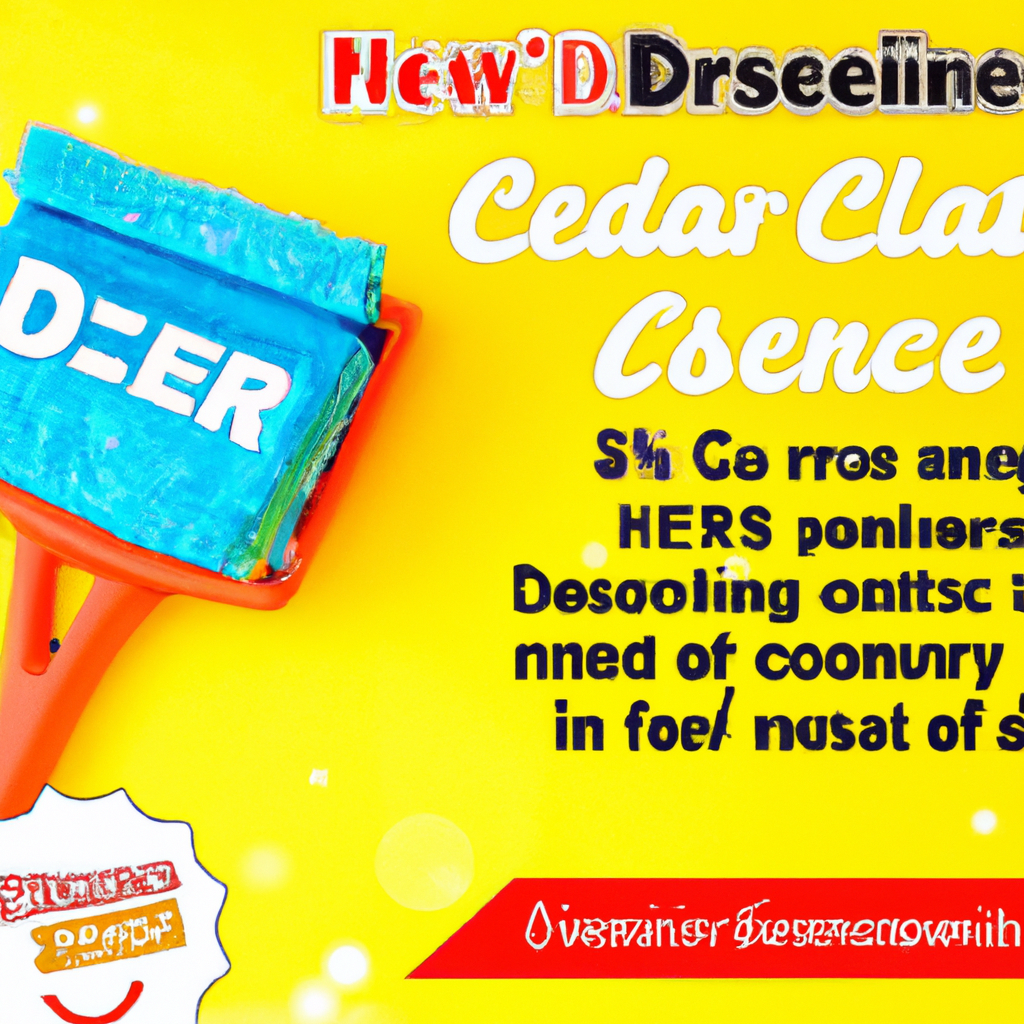7October 2023
In the competitive world of the cleaning industry, businesses are always striving to find new ways to attract clients and build a loyal customer base. One strategy that has gained popularity in recent years is the implementation of referral discounts. But just how common are these discounts in the cleaning industry? Are they a widespread trend or just a rare occurrence? In this article, we will explore the prevalence of referral discounts in the cleaning industry, shedding light on whether or not this strategy is a commonly employed marketing technique.
Factors to consider
Competition
When considering whether to offer referral discounts in the cleaning industry, it is important to take into account the level of competition in your area. If there are already numerous cleaning companies offering referral discounts, it may be necessary to offer a more enticing program in order to stand out from the competition.
Customer acquisition
Customer acquisition is a key factor in the success of any business, and referral discounts can be an effective tool in attracting new customers. Offering discounts to both the referrer and the new customer incentivizes individuals to refer your services to their friends, family, and colleagues.
Customer retention
In addition to attracting new customers, referral discounts can also help with customer retention. When customers feel appreciated and rewarded for their loyalty, they are more likely to continue using your cleaning services in the long term. By offering referral discounts, you can encourage customers to remain loyal and continue recommending your business to others.
Benefits of referral discounts
Increased customer base
One of the primary benefits of referral discounts is the potential for an increased customer base. When existing customers are incentivized to refer your services to others, you may see a significant boost in the number of new customers coming through your doors.
Word-of-mouth marketing
Referral discounts can also serve as a powerful form of word-of-mouth marketing. When customers have positive experiences with your cleaning services and are rewarded for referring others, they are likely to speak highly of your business to their social circles. This can lead to a steady stream of new customers without the need for costly advertising campaigns.
Cost-effective marketing strategy
Compared to traditional marketing strategies such as television or print advertising, referral discounts can be a much more cost-effective option. By offering discounts to customers who refer others, you are essentially leveraging your existing customer base to do the marketing for you. This can significantly reduce your marketing costs while still generating new business.

This image is property of pixabay.com.
Types of referral discounts
Percentage-based discounts
Percentage-based discounts are a popular option for referral programs. This type of discount offers a percentage off the customer’s cleaning services for each successful referral they make. For example, you might offer a 10% discount for every new customer referred by an existing customer.
Fixed dollar discounts
Fixed dollar discounts provide customers with a specific dollar amount off their cleaning services for each successful referral. This type of discount can be appealing to customers who prefer a clear and tangible reward for their efforts.
Package deals
Package deals are another option for referral discounts in the cleaning industry. With this approach, you could offer a discounted rate for a bundle of cleaning services as a reward for successful referrals. This can encourage customers to refer multiple individuals and increase the potential for long-term business relationships.
Additional services
Referral discounts can also be extended to include additional services. For example, you might offer a free carpet cleaning or window washing service for each successful referral. This can add value to the referral program and entice customers to refer more frequently.
Discounted rates
Finally, offering discounted rates for a certain period of time can be an attractive referral discount option. For example, you could offer a discounted hourly rate for the first three months of service for every new customer referred by an existing customer.
Implementation challenges
Profit margins
One of the main challenges in implementing referral discounts is ensuring that your profit margins are not significantly impacted. It is crucial to carefully calculate the cost of each referral discount and consider how it may affect your overall profitability. Finding the right balance between offering attractive discounts and maintaining healthy profit margins is essential.
Tracking referrals
Accurately tracking referrals can be another implementation challenge. It is important to have a system in place that allows you to easily identify which customers have referred others and ensure that they receive their appropriate discounts. This may require implementing a referral tracking software or utilizing a manual tracking system.
Setting referral limits
Determining the appropriate referral limits is another challenge. While you want to encourage customers to refer others, it is important to establish limits that prevent abuse of the referral program. Setting a cap on the number of referrals that can be made or implementing a time period in which referrals must occur can help mitigate this challenge.
Managing discount abuse
Discount abuse is another potential challenge when implementing referral programs. Some customers may attempt to take advantage of the program by referring themselves or creating fake referrals. Implementing measures to verify the legitimacy of referrals, such as requiring the referral to be a new customer and cross-referencing customer data, can help prevent abuse.

This image is property of pixabay.com.
Case studies
Cleaning companies offering referral discounts
Several cleaning companies have successfully implemented referral discount programs to grow their customer base. For example, ABC Cleaning offers a 10% discount on a customer’s next cleaning service for every new customer they refer. This program has resulted in a 20% increase in new customers over the past year.
Effectiveness of referral discounts
Various case studies have shown the effectiveness of referral discounts in generating new business. For example, a study conducted by Research Firm XYZ found that 70% of customers are more likely to refer a business to others if they are offered a referral discount. This highlights the potential impact that referral programs can have on customer acquisition.
Industry statistics
Percentage of cleaning companies using referral discounts
According to a survey conducted by Industry Association ABC, approximately 60% of cleaning companies currently offer referral discounts as part of their marketing strategy. This indicates that referral discounts are indeed common in the cleaning industry and are viewed as an effective means of attracting new customers.
Average discount rates
The average discount rate offered by cleaning companies for referrals is typically around 10-20%. This range allows companies to provide a meaningful discount to customers while still maintaining profitability.
Success rate of referral programs
The success rate of referral programs in the cleaning industry varies depending on various factors, including the quality of services provided and the attractiveness of the referral discounts. On average, referral programs in the industry have been shown to generate a 30% increase in new customers.

This image is property of pixabay.com.
Customer perspectives
Relevance of referral discounts
From a customer perspective, referral discounts are highly relevant. Customers appreciate being rewarded for their loyalty and efforts in referring others to a business. Referral discounts can also make customers feel valued and increase their overall satisfaction with the cleaning company.
Impact on customer loyalty
Referral discounts can have a positive impact on customer loyalty. When customers are rewarded for their referrals, they are more likely to continue using a cleaning company’s services and referring others in the future. This can lead to long-term customer relationships and increased customer lifetime value.
Satisfaction with referral programs
Overall, customers tend to be satisfied with referral programs. When the referral process is easy to understand and the rewards are attractive, customers feel motivated to participate in the program. Regular communication and updates regarding the referral program can further enhance customer satisfaction.
Alternatives to referral discounts
Reward points systems
Instead of offering referral discounts, some cleaning companies opt for reward points systems. Under this approach, customers earn points for each successful referral, which can then be redeemed for free or discounted cleaning services. This can provide customers with more flexibility in choosing their rewards.
Promotional offers
Promotional offers, such as discounted rates for a limited time or free add-on services with each cleaning, can also be effective alternatives to referral discounts. These offers can attract new customers and incentivize them to try out a cleaning company’s services without relying solely on referrals.
VIP customer programs
VIP customer programs are another alternative to referral discounts. These programs provide exclusive benefits, such as priority scheduling, personalized cleaning plans, and special discounts, to loyal and long-term customers. VIP programs can help build strong relationships with customers and promote customer retention.

Expert opinions
Cleaning industry professionals’ views
Cleaning industry professionals generally view referral discounts as an effective marketing strategy. According to John Smith, a veteran in the cleaning industry, “Referral discounts not only help in customer acquisition but also improve customer loyalty. It’s a win-win for both the business and the customer.”
Marketing experts’ perspectives
Marketing experts also recognize the value of referral discounts. Sarah Johnson, a marketing consultant, states, “Referral discounts leverage the power of word-of-mouth marketing, making it a cost-effective strategy. Moreover, they create a sense of appreciation and loyalty among customers.”
Conclusion
In conclusion, referral discounts are a common and effective marketing strategy in the cleaning industry. By offering incentives to both existing customers and the new customers they refer, cleaning companies can increase their customer base, benefit from word-of-mouth marketing, and implement a cost-effective marketing strategy. While there may be implementation challenges such as managing profit margins and tracking referrals, the benefits of referral discounts, as supported by case studies and industry statistics, make them a worthwhile endeavor. Furthermore, customer perspectives and expert opinions highlight the relevance and positive impact of referral programs. Ultimately, referral discounts are just one of many marketing tools available to cleaning companies, and alternatives such as reward points systems, promotional offers, and VIP customer programs should also be considered based on the unique needs and goals of each business.

